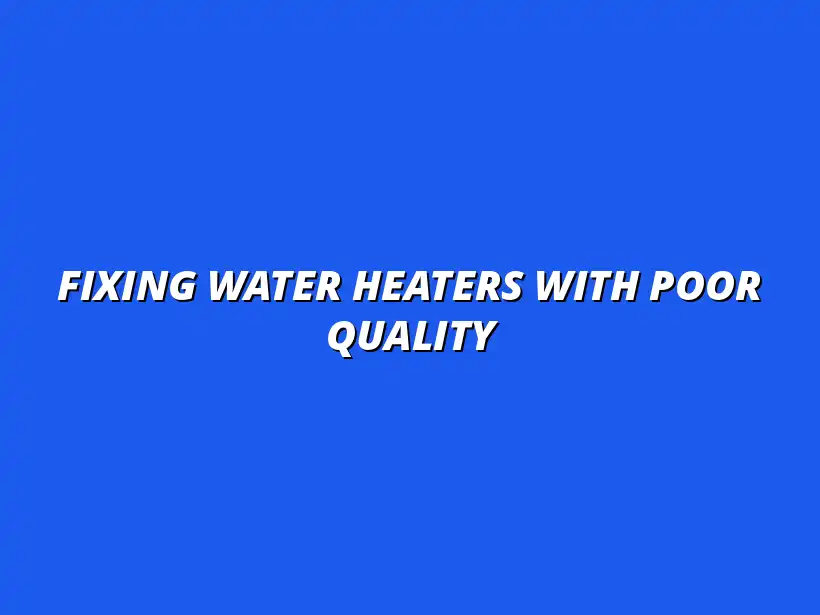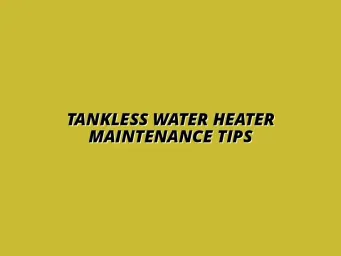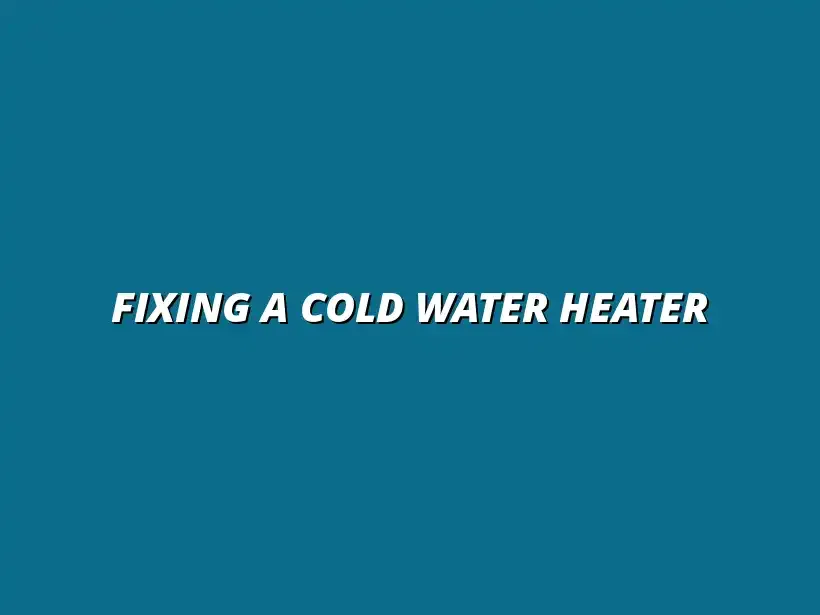
Fixing Water Heaters with Poor Quality
Understanding Water Quality Issues and Their Impact on Water Heaters
Water quality is essential for the proper functioning of your home’s water heater. If the water coming into your heater has impurities, it can cause various problems that affect its performance and lifespan. Understanding how water quality directly impacts your water heater can help you maintain it better and avoid costly repairs.
Poor water quality can lead to inefficiencies in heating and even damage crucial components of your system. When contaminants like minerals and metals enter your heating system, they can cause buildup that hinders performance. In the long run, addressing these water quality issues can save you time, money, and headaches!
The Link Between Water Quality and Water Heater Performance
The relationship between water quality and heater performance is significant. When your water is hard or contains corrosive elements, it can lead to several heating problems. It's crucial to understand these connections to ensure that your water heater continues to function effectively.
In many cases, hard water—water that has high mineral content—can lead to low heating efficiency. This means that your heater has to work harder to raise the temperature of the water, which can increase energy bills and wear down the system faster. Regularly checking and addressing water quality can go a long way in maintaining the efficiency of your heater. If you're experiencing low water pressure alongside this, you might want to check out this guide on fixing low water pressure in heaters.
How Poor Water Quality Affects Heating Efficiency
Poor water quality can significantly impact how efficiently your water heater operates. Various factors contribute to this, including:
- Mineral buildup: Accumulation of minerals like calcium and magnesium can create a thick layer inside the tank.
- Corrosion: Rust and other metal contaminants can damage the heating elements.
- Insulation loss: When sediments form, they can affect the heater's ability to retain heat.
These issues lead to increased energy consumption and can shorten the lifespan of your heater. Recognizing these factors early can help prevent more extensive damage down the line!
Signs of Water Quality Problems in Your Water Heater
Identifying water quality issues can save you from significant problems later. Here are some common signs that your water heater may be suffering from poor water quality:
- Unusual odors: A rotten egg smell might indicate sulfur bacteria in the water.
- Discoloration: Cloudy or rusty water can signal corrosion or the presence of sediment.
- Noise: Rumbling or popping sounds can be due to mineral buildup.
If you notice any of these signs, it’s important to take action quickly. Addressing the underlying water quality issues can restore your water heater's efficiency and keep your home comfortable. For example, learning how to unclog your bathroom drain easily can help prevent some water quality issues.
Identifying Common Water Quality Problems
Understanding common water quality problems is vital for maintaining your water heater's performance. Many issues stem from various impurities that can negatively impact both the heater and the water you use. By identifying these problems early, you can take preventive measures to avoid costly repairs.
Common impurities include minerals, metals, and contaminants that can lead to serious operational issues. Let’s take a closer look at the types of impurities you might encounter and how they affect your hot water systems.
Types of Impurities Affecting Water Heaters
There are several types of impurities that can affect your water heater, and being aware of them can help you maintain better water quality. Two of the most common types include:
- Minerals: Calcium and magnesium are often found in hard water and can lead to mineral buildup.
- Corrosive metals: Elements like iron and copper can cause rust and deterioration over time.
Identifying these impurities early on can help you implement solutions to protect your water heater and ensure it runs efficiently! For more in-depth information on water heater maintenance, consider reading this article on annual water heater inspection tips.
Mineral Buildup: Calcium and Magnesium
Mineral buildup is a frequent problem for water heaters, especially in areas with hard water. Over time, calcium and magnesium can accumulate, leading to:
- Reduced heating efficiency: Mineral deposits create insulation, requiring more energy for heating.
- Increased wear and tear: Components may be strained due to the additional burden of mineral buildup.
- Potential leaks: Buildup can lead to cracks or leaks within the tank.
Regular maintenance and flushing of the tank can help prevent these issues from escalating!
Corrosion Issues and Metal Contaminants
Corrosion is another significant issue that can arise from poor water quality. Water that is too acidic or contains high levels of certain metals can lead to:
- Rust formation: This can weaken the tank and reduce its overall lifespan.
- Contaminated water supply: Rust and other metal particles can enter your water, affecting its quality.
- Increased repair costs: Corroded components often need replacement, leading to higher expenses.
By addressing corrosion early, you can prolong the life of your water heater and maintain better water quality for your home. If you're dealing with a leak, learning about water heater leak causes and fixes is crucial.
Symptoms of Poor Water Quality in Hot Water Systems
Recognizing the symptoms of poor water quality in your hot water system is vital for taking appropriate action. Many homeowners may overlook these signs, but it’s essential to remain vigilant. Keep an eye out for the following symptoms:
- Unusual odors: A foul smell coming from your hot water could be a sign of bacteria.
- Discoloration: If your hot water appears cloudy or has a tint, this could indicate impurities.
- Temperature fluctuations: Inconsistent water temperature may signify buildup or corrosion.
Being proactive can help you maintain your water heater's performance and ensure your home enjoys clean, quality water! Sometimes, simple DIY fixes can resolve issues; for example, check out this guide on fixing a running toilet easily.
Unusual Odors and Discoloration
Unusual odors and discoloration are often clear indicators of water quality issues. If you notice any of the following, it’s time to investigate:
- Rotten egg smell: This could indicate hydrogen sulfide gas.
- Brown or rusty water: A sign of corrosion within your water heater.
- Cloudy water: This might suggest the presence of sediments or minerals.
Addressing these issues quickly can help restore your water quality and keep your water heater operating smoothly!
Fluctuating Water Temperature and Pressure Issues
Fluctuating water temperature and pressure can be frustrating. These symptoms often arise from:
- Mineral buildup: This affects the heater’s ability to maintain consistent temperatures.
- Corrosion: Deteriorating parts can lead to pressure drops in the system.
If you experience these issues, it’s essential to assess your water quality and the condition of your heater to prevent further complications. For kitchen plumbing issues, fixing a clogged kitchen sink can sometimes be a related problem.
Step-by-Step Guide to Repairing a Water Heater with Poor Water Quality
When it comes to fixing your water heater, especially if poor water quality is involved, a systematic approach is crucial. Repairing a water heater can seem daunting, but with the right guidance and tools, you can tackle it efficiently. Let's dive into the preparation and steps you'll need to follow!
Preparation for Repair: Tools and Safety Precautions
Before starting any repairs, it’s important to gather the correct tools and make sure you’re safe while working. You’ll need a few essential items to ensure the repair goes smoothly. Here’s a handy list of tools that can help:
- Adjustable wrench
- Flathead and Phillips screwdrivers
- Bucket or pan for water
- Shop vacuum for clearing debris
- Safety goggles and gloves
Having the right tools on hand can make the repair process faster and easier. Additionally, don't forget to prioritize safety! You should ensure the power supply is turned off and that you are working in a well-ventilated area. This will help you avoid risks such as burns or electric shocks while handling the heater. Remember to consult a professional plumber, especially in areas like Alcester, Birmingham, if you're unsure: Plumber in Alcester, Birmingham.
Essential Tools for Water Heater Repair
Knowing which tools to use can save you time and frustration. Some tools are essential for basic repairs, while others may be more specialized. Here’s a more detailed look:
- Pipe Wrench: Useful for tightening or loosening plumbing connections.
- Multimeter: To check electrical connections and ensure everything is functioning properly.
- Hose: For flushing the tank or draining water safely.
These tools are not just for repairs but also for routine maintenance. Keeping them handy will encourage you to regularly check on your water heater's condition!
Safety Measures Before Starting Repair Work
Safety should always come first! Before you start repairing your water heater, there are several precautionary measures to keep in mind:
- Disconnect the power supply or turn off the gas.
- Turn off the water supply to prevent leaks.
- Use protective gear such as gloves and goggles.
Following these safety measures can help you avoid accidents while working on your heater. Remember, taking time to prepare is key to a successful repair!
Addressing Common Water Quality Issues
Once you’re prepared, it's time to tackle the specific problems caused by poor water quality. Addressing these issues not only improves your heater's performance but also extends its lifespan. Let’s look at two of the most common solutions.
Flushing the Tank to Remove Mineral Deposits
Mineral buildup can significantly decrease the efficiency of your water heater. Flushing the tank regularly helps to clear out accumulated minerals, ensuring smooth operation. Here’s how to do it:
- Turn off the power or gas supply.
- Connect a garden hose to the drain valve.
- Open the drain valve and let the water flow out into a bucket or drain.
- Once empty, close the valve and refill the tank with fresh water.
Flushing your tank should be part of your regular maintenance routine; it's a great way to keep your heater running efficiently!
Replacing Anode Rods to Combat Corrosion
Anode rods play a crucial role in preventing corrosion within your water heater. If they become depleted, it can lead to significant damage over time. Here’s a simple guide to replacing them:
- Locate the anode rod at the top of your water heater.
- Use a socket wrench to remove the old rod.
- Install a new anode rod and tighten it securely.
Regularly checking and replacing anode rods can help extend the life of your water heater and improve the quality of your water.
Frequently Asked Questions About Water Heater Repairs
Even after following all these steps, you might have some lingering questions. Let’s address a few common concerns about water heater repairs and water quality.
Can Poor Water Quality Lead to Complete Water Heater Failure?
Absolutely! Poor water quality can cause significant damage over time. Things like corrosion and mineral buildup can make your water heater work much harder, leading to potential failures.
How Often Should I Check Water Quality and Maintain My Water Heater?
It’s a good idea to check your water quality at least once a year, along with performing maintenance. Regular checks can prevent larger issues down the line and help keep your system running efficiently.
What Are the Best Water Filtration Options to Improve Water Quality?
Investing in a good filtration system can make a big difference! Here are a few types worth considering:
- Whole-house filtration systems
- Reverse osmosis units
- Activated carbon filters
Choosing the right system will depend on the specific impurities you face in your water supply.
Long-Term Solutions for Maintaining Water Quality and Heater Efficiency
After addressing immediate concerns, it's vital to think long-term. Implementing ongoing solutions can keep your water heater efficient and your water supply clean!
Installing Water Softeners and Filtration Systems
Water softeners and filtration systems can drastically improve water quality. They help remove hard minerals and contaminants that can damage your water heater.
Benefits of Water Softeners for Heater Longevity
Using a water softener can reduce mineral buildup in your heater. This not only enhances heating efficiency but also prolongs the life of the unit!
Selecting the Right Filtration System for Your Home
Choosing the right filtration system involves understanding your water quality issues. It’s essential to consider:
- Type of impurities in your water
- Size and capacity of the unit
- Your budget and maintenance preferences
Researching these factors will help you find the ideal solution for your needs.
Creating a Maintenance Schedule for Your Water Heater
Establishing a regular maintenance schedule is key to keeping your water heater running smoothly. Consistent checks and upkeep can prevent costly repairs later.
Routine Inspections and Water Quality Testing
Make it a habit to inspect your heater and test the water quality at least once a year. This proactive approach will help you spot potential issues before they escalate.
Professional Services and When to Call an Expert
Sometimes, DIY repairs just aren't enough. If you notice persistent issues or feel unsure, don’t hesitate to call in professional help. They can provide specialized knowledge to tackle complex problems.
Final Thoughts on Water Heater Care and Maintenance
Taking care of your water heater and ensuring good water quality is essential for home comfort. By addressing issues promptly and maintaining your system, you can enjoy hot water when you need it!
Understanding the Importance of Water Quality for Home Comfort
Water quality is often overlooked but plays a critical role in the efficiency of your water heater. Quality water leads to better heating performance and overall satisfaction in your home.
Encouraging Proactive Maintenance and Regular Assessments
Regular maintenance and assessments are the keys to a healthy water heater. Encourage yourself and your family to stay involved in these practices to keep your home comfortable and efficient!




